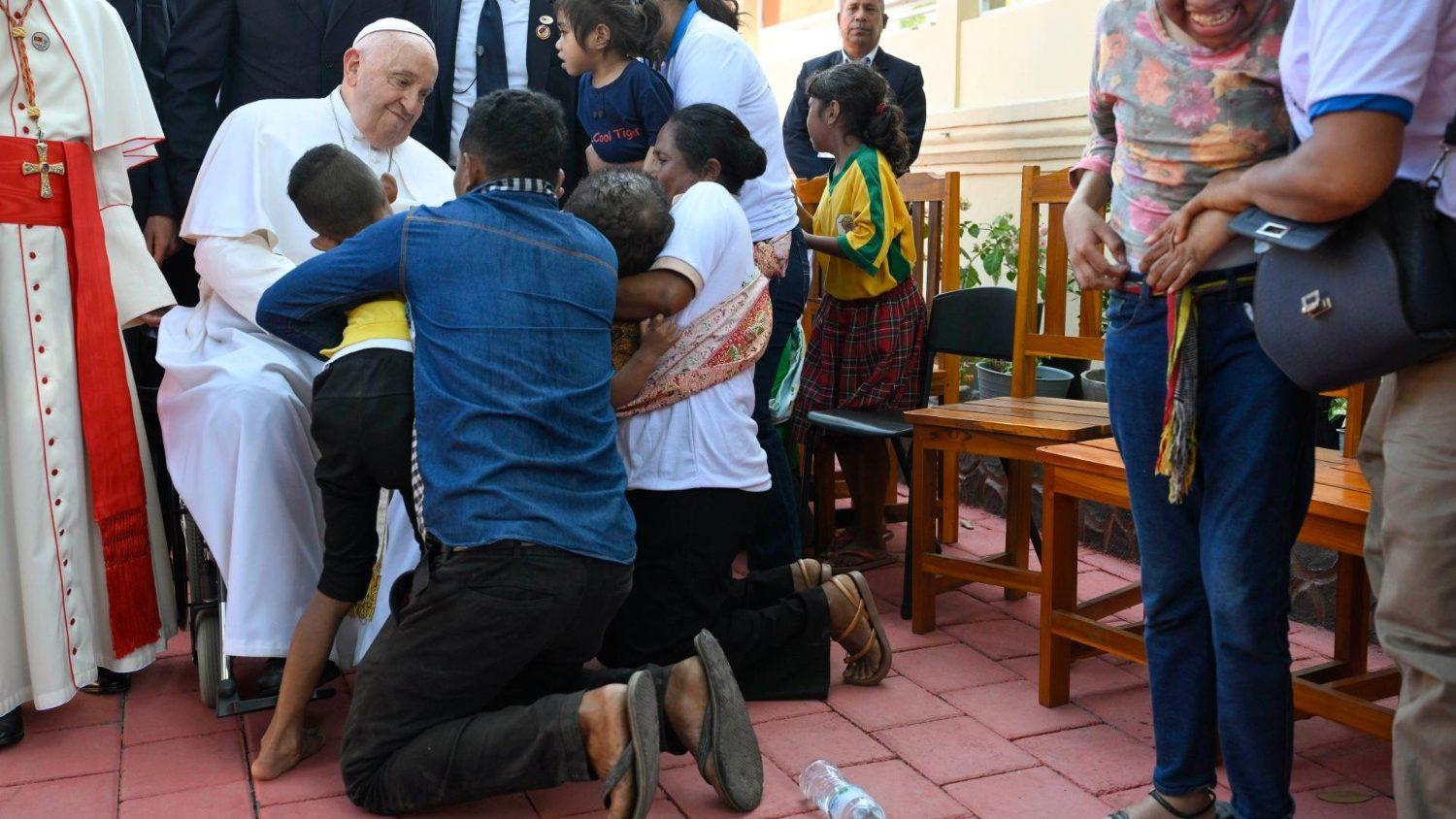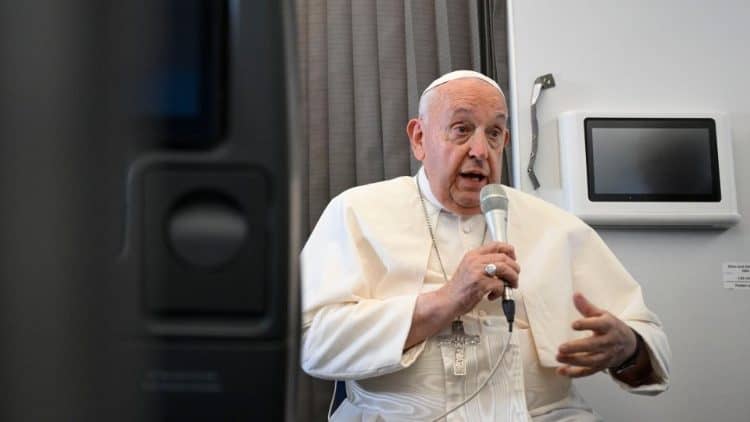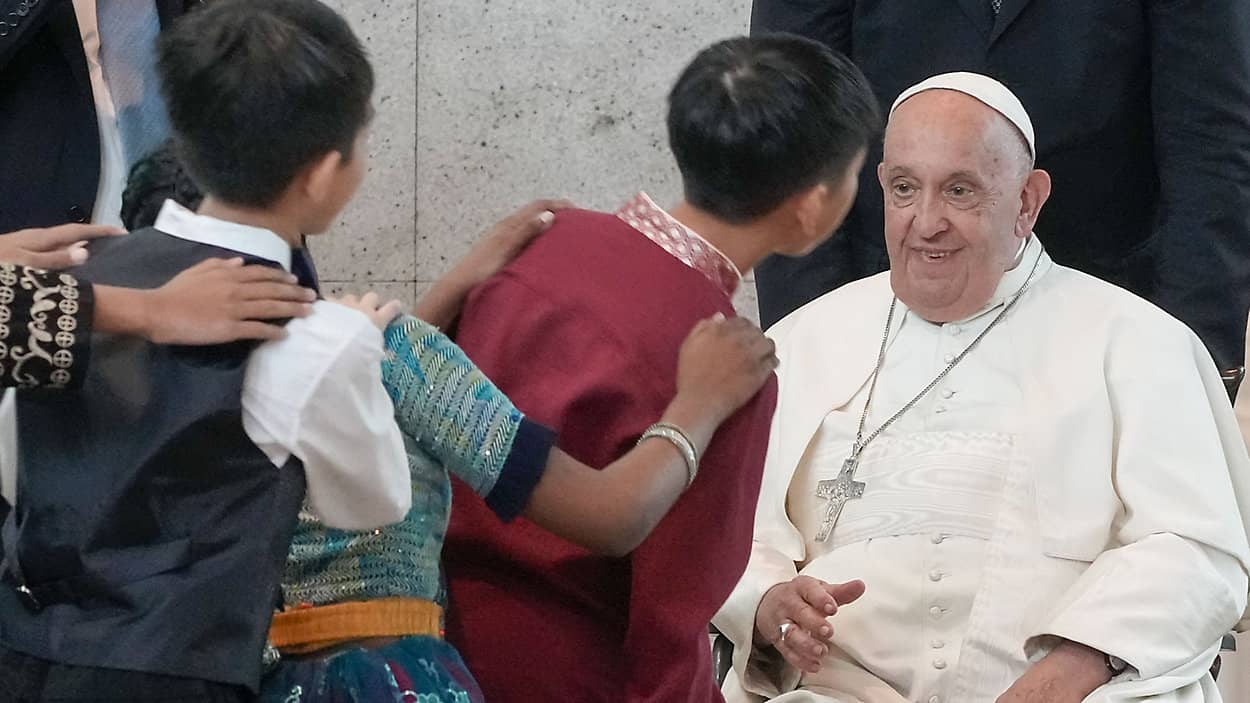DILI – As he prepared to leave East Timor, half of whose population is under the age of 30, Pope Francis told young people to respect the elderly and to love others regardless of differences, giving them his classic instruction to “wreak havoc” for God.
Speaking to young people before his departure from Dili Sept. 11, the pope asked them a series of questions about what youth do, eliciting answers such as “proclaim Christ,” “proclaim the Word of God” and “love.”
In an entirely off-the-cuff speech, Francis told them to also never forget to “wreak havoc, make a mess.”
He applauded the high number of youths in the country, and said that as he left, “I will never forget your smile. Don’t stop smiling.”
Francis visited Dili from Sept. 9-11 as part of a broader tour of Asia and Oceania that also took him through Indonesia and Papua New Guinea. His last stop will be Singapore, where he will spend three days before returning to Rome Friday.
His visit to East Timor – Asia’s largest Catholic nation in terms of percentage – comes less than 25 years after its independence from Indonesia, obtained after a lengthy violent conflict that is still present in the recent memory of most citizens.
The last appointment on the pope’s schedule was his meeting with young people, who make up over 60 percent of the population of East Timor.
During the meeting Wednesday, he heard testimonies from four youths, including Cecilia Efranio Bonaparte, who spoke of the negative impact of technology on her family, and addiction to cellphones among her peers.
Another youth named Rogéria dos S. X. Baptista spoke of how dirty the city was and the impact of human behavior on climate change and asked how to promote awareness and build better attitudes.
A Muslim youth named Ilham Mahfot Bazher spoke of good interreligious tolerance in East Timor and thanked the pope for his 2019 Document on Human Fraternity, which the Timorese government adopted in 2022, with the idea that it be included in school curricula. He spoke about the need to build tolerance through social media.
Young person Nelson M. da Conceição spoke of the growing problem in East Timor of youth who join gangs specialized in martial arts and who commit violence toward others, asking how to make East Timorese more fraternal.
Pope Francis during the encounter tossed his prepared speech and spoke entirely off the cuff, telling youths that as the majority of the population in East Timor, they represent a call to “life, hope and the future.”
“Don’t lost the enthusiasm of your faith,” he said, cautioning youth against the “vendors of happiness” that sell “drugs, they sell many things that give you happiness for half an hour, no more.”
He told young people to continue moving forward with joy, and to never forget that they are “heirs to those that preceded you in founding this nation. For this reason, don’t lose your memory. The memory of those who preceded you and with a lot of sacrifices consolidated this nation.”
Both the youth of the country and the smiles of its people were two things the pope said “touched my heart” in East Timor, he said, and told them to keep dreaming.
A young person who doesn’t dream falls into temptations such as drugs and alcohol, he said, jesting that if they drink too much, they will get injured. A young person who does not dream, he said, is “a pensioner.”
Young people “have to make a mess in order to show the life that you have,” he said.
A young person is “in the middle of the path of life, in the middle, between children and adults,” he said, and stressed the importance of forging strong ties with and respect for the elderly, calling elderlies “one of the most beautiful and wonderful riches of a society.”
“It is the elderly who give wisdom to the youth,” he said, saying a society like East Timor with so many young people has a responsibility to care for both its children and its elderly, saying, the two greatest treasures that a society has are children and elderly, together.
Recalling East Timor’s battle for independence, which it achieved in 2002, Pope Francis told youths that they had a country with “a marvelous history of heroism, of faith, of martyrdom, and above all, of faith and reconciliation.”
In this regard, he said three things are important for youth, and that those things are freedom, commitment and fraternity.
Speaking of freedom, he asking, “a young man or woman who is not capable of governing themselves, who is not capable of living this, what are they?”
They are “a slave,” he said, saying without a strong ability to manage oneself and make good decisions, a person ends up chasing nothing more than their own desires, making them feel “omnipotent” and making them “arrogant.”
Instead, a young person who is committed, who works, and knows how to make wise decisions is one who “takes responsibility” and is a companion to others around them, he said, saying they are “a young person who loves their homeland.”
Pope Francis also underlined the importance of caring for the environment and promoting the unity of the family, saying a young person “must learn that to be free does not mean doing whatever they want, but rather, that they have responsibility.”
“One of the responsibilities is to learn to care for the common home,” he said, saying, “this is why young people must commit.”
Francis noted that many families in East Timor have endured difficulties and suffering in the path to independence and spoke of the importance of reconciliation and of building fraternity, “being friends, not enemies.”
“Your parents, even with different ideas, were brothers,” he said, telling the youths that it is okay to have different ideas, and that if they fight, they must always find a way to reconcile.
He underlined the importance of fostering an attitude of “love and reconciliation,” and addressed the problem of bullying.
Bullying, he said, “is an attitude that profits from the weakest: because they are ugly, they are fat, they walk poorly. They use the weakness of others.”
“Please, from now no, let there be no more,” he said.
Pope Francis closed his speech reiterating his desire for young people to “wreak havoc” and “make a mess,” and reminding them of the importance of respecting and listening to the elderly, and of maintaining their joyful spirit.
Follow Elise Ann Allen on X: @eliseannallen













